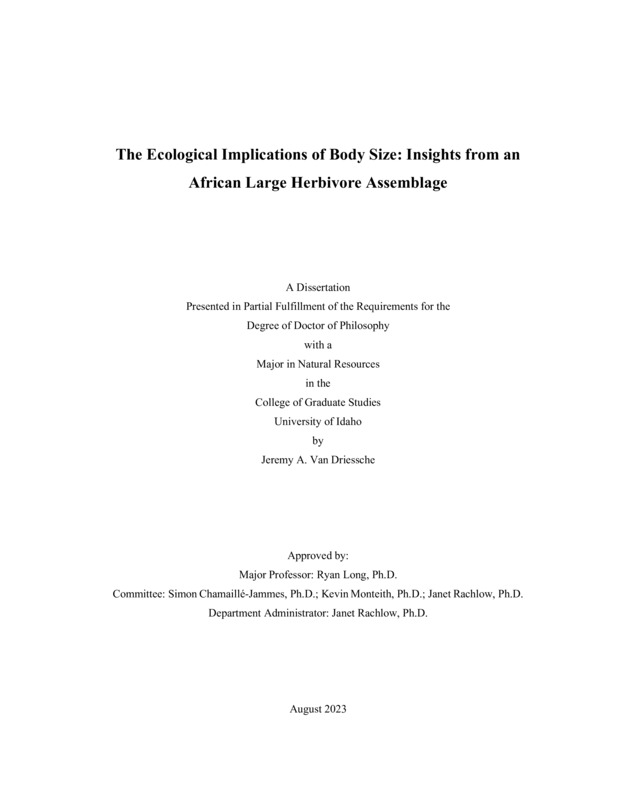The Ecological Implications of Body Size: Insights from an African Large Herbivore Assemblage
Van Driessche, Jeremy A.. (2023-08). The Ecological Implications of Body Size: Insights from an African Large Herbivore Assemblage. Theses and Dissertations Collection, University of Idaho Library Digital Collections. https://www.lib.uidaho.edu/digital/etd/items/vandriessche_idaho_0089e_12675.html
- Title:
- The Ecological Implications of Body Size: Insights from an African Large Herbivore Assemblage
- Author:
- Van Driessche, Jeremy A.
- Date:
- 2023-08
- Program:
- Natural Resources
- Subject Category:
- Wildlife conservation
- Abstract:
-
Variation in body size—6 orders of magnitude in mammals alone—is a defining feature of the animal kingdom and governs biological processes across levels of organization. Body size has pronounced effects on everything from rates of heat exchange to vulnerability to predation, and thus studies of scaling relationships have yielded many powerful insights into species’ responses to environmental variation. Scaling relationships between body size and behavior, however, have received comparatively little attention, despite the fact that behavioral plasticity is typically the first line of defense in the face of environmental change. I first investigated how body size modulates behavioral and physiological strategies used by two closely related antelope (bushbuck, Tragelaphus sylvaticus and greater kudu, Tragelaphus strepsiceros) to cope with diminishing water availability during the austral dry season. Surface water dependence is generally considered to scale positively with body size, but using a diverse suite of data streams I found the opposite in my study species: bushbuck, the smaller species, consumed more preformed water, spent more time drinking, and strengthened their selection for surface water later in the dry season more than kudu. These results support the contention that body size alone is insufficient for predicting surface water dependence, and that interspecific differences in surface water dependence could have important effects on the distribution and composition of large-herbivore communities as temperatures warm and droughts become more frequent and severe. Next, I evaluated how key components of individuals’ niche space (e.g., diet composition, habitat use and movement patterns) differ between male and female bushbuck, kudu, and a third congener, nyala (Tragelaphus angasii), that all exhibit pronounced sexual size dimorphism. I found considerable variation among species in the axes along which males and females partitioned their foraging behaviors, and this variation appeared to be driven by factors other than size dimorphism. Bushbuck, the smallest species, showed the greatest sex-dependent difference in diet quality. Nyala showed the greatest difference in habitat use, and kudu, the largest species (~4× larger than bushbuck), showed the greatest difference in movement behavior. This variation suggests that sex-dependent niche partitioning, and ultimately sexual segregation, is influenced by a suite of ecological factors that do not all covary with sexual size dimorphism in ungulates. Finally, I investigated whether foraging behavior differs between tusked and tuskless female African elephants (Loxodonta africana) in a population where tusklessness evolved rapidly in response to intensive poaching pressure. Elephants are a keystone species, and they are responsible for landscape-scale changes in vegetation structure and composition via their destructive foraging behaviors, at least some of which involve the use of tusks (e.g., stripping bark, toppling trees). I found that tuskless females showed stronger selection for grassland habitat than tusked females; however, both tusk morphs selected woodland habitats more strongly than grassland regardless of season. These results suggest that intensive poaching for ivory could have consequences for savanna ecosystems that are mediated by elephant behavior.
- Description:
- doctoral, Ph.D., Natural Resources -- University of Idaho - College of Graduate Studies, 2023-08
- Major Professor:
- Long, Ryan
- Committee:
- Rachlow Witham, Janet; Chamaillé-Jammes, Simon; Monteith, Kevin
- Defense Date:
- 2023-08
- Identifier:
- VanDriessche_idaho_0089E_12675
- Type:
- Text
- Format Original:
- Format:
- application/pdf
- Rights:
- In Copyright - Educational Use Permitted. For more information, please contact University of Idaho Library Special Collections and Archives Department at libspec@uidaho.edu.
- Standardized Rights:
- http://rightsstatements.org/vocab/InC-EDU/1.0/

